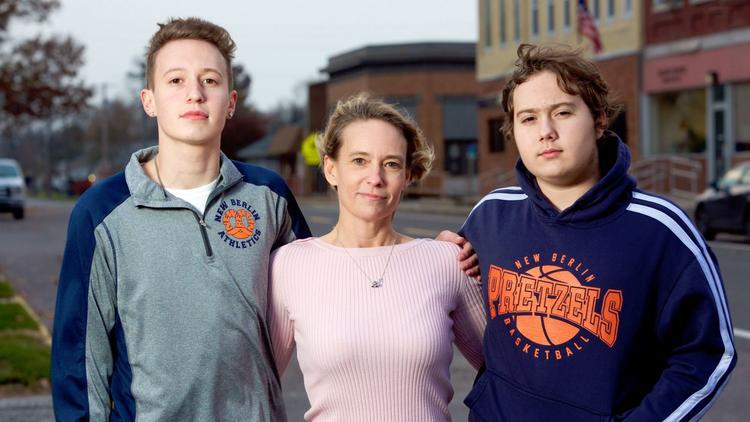|
Creating a comfortable climate at home for kids to talk about sexual assault
By Danielle Braff
[with video] When she was 15, Michelle Forbes’ high school teacher reached up her skirt between her legs. Shortly after, the same teacher brought her to a secluded area in the woods and taught her how to perform oral sex on him. And on her 17th birthday, he had intercourse with her for the first time. When a false rumor started going around school that Forbes was pregnant with the teacher’s child, he called her into his office and berated her, saying, “‘I thought you were mature enough for this: Do you want me to lose my job? If you tell, I’ll humiliate you.’” It wasn’t until two years ago that Forbes, now 46, told her parents the details of the sexual abuse she endured. She’s not alone. The National Intimate Partner and Sexual Violence Survey found that 8.5 million women and 1.5 million men experienced sexual violence before the age of 18. According to Darkness to Light, a nonprofit organization committed to preventing child sex abuse, only 38 percent of child victims disclose their abuse, and many of those tell a friend, not a parent. To help kids recognize and stop the abuse, parents need to create a climate at home where children feel comfortable talking about it — even when a predator is threatening them. “Children should start learning about sexual harassment at an early age, but use developmental language to avoid scaring them,” said Kelsey Torgerson, a licensed clinical social worker and childhood trauma specialist at Compassionate Counseling in St. Louis. That means teaching them about the private-part rule: no touching other people’s private parts, no looking at other people’s private parts, no showing your private parts to other people, Torgerson said. “By letting them know that these are rules that grown-ups already know, you can help identify safe people to tell if someone breaks a private-part rule on them.” Parents can bring this up naturally when young kids are taking a bath, said Natasha Daniels, a child therapist in Phoenix. “Just like we teach kids how to be safe around water or when riding a bike, it is important that we teach kids how to keep their bodies safe,” she said. This should begin in the toddler years, as children need to be comfortable talking about body parts and sex so there is no shame or secrecy concerning any part of the body, said Kathryn Stamoulis, a New York-based licensed mental health counselor specializing in female adolescent sexuality. They need to be equipped with the ability to articulate anything they need to communicate, Stamoulis said. “Talking about sex and sexuality in an age-appropriate manner throughout childhood provides a child with a trusted adult that they can turn to when they need it,” Stamoulis said. “If sex is taboo in the household, a child is not going to tell his or her parent about harassment they experienced or ask questions about consent.” Once a child enters school, it’s time to talk about boundaries. For example, when someone hugs your child when he doesn’t want to be hugged, you can use that as an opening lesson on consent, Stamoulis said. That’s why Amy Pagliarella, a mother of an 8- and 10-year-old in Chicago, uses the times when her sons don’t want to hold her hand as teaching moments. “I’ve been building trust with my kids before we need it,” Pagliarella said. If they are taking a walk and she wants to hold hands with her sons, but they pull away, she lets go of their hands, explaining that they get to decide when someone holds them or touches them or kisses them. The same goes for how they treat other people. She also constantly reminds her children that they can tell her anything without getting in trouble, even if they’ve made a mistake. For example, Pagliarella said, one of her sons constantly lies to her about brushing his teeth. “I say, ‘Buddy, you can always tell me the truth — I have your back, and you can be honest with me,’” Pagliarella said. Since many kids fear getting in trouble or upsetting their parents after something negative happens, it’s important to continually reassure them that they can say anything without repercussions, Torgerson said. “Make your child feel comfortable by letting them know that if something scary, yucky or confusing happens, your biggest job is keeping them safe,” Torgerson said. “They won’t get in trouble.” Sometimes, however, parents or teachers will be able to figure out something is wrong by the child’s body language. She might avoid eye contact, start acting differently or tell stories about friends having something bad happening to them, Torgerson said. But, she said, there are some kids who will do their best to hide any issues. Six-time Olympic medal-winning gymnast Aly Raisman, for example, recently spoke out against Larry Nassar, the USA Gymnastics physician, whom she said had sexually molested her — yet while this was occurring, she was still able to become one of the greatest gymnasts in the world. “Typically, you either have kids who are displaying obvious signs — they’re acting out or shutting down,” Torgerson said. “But you also have kids who want to be on their best behavior because a scary thing is going on and they are trying to keep the secret.” The best thing you can do is to keep letting your children know that you’re a safe person to speak with, no matter what, Torgerson said. Keep having the conversation, whether in early childhood or in their teen years. You’re on their side, no matter what.
|
.
Any original material on these pages is copyright © BishopAccountability.org 2004. Reproduce freely with attribution.
